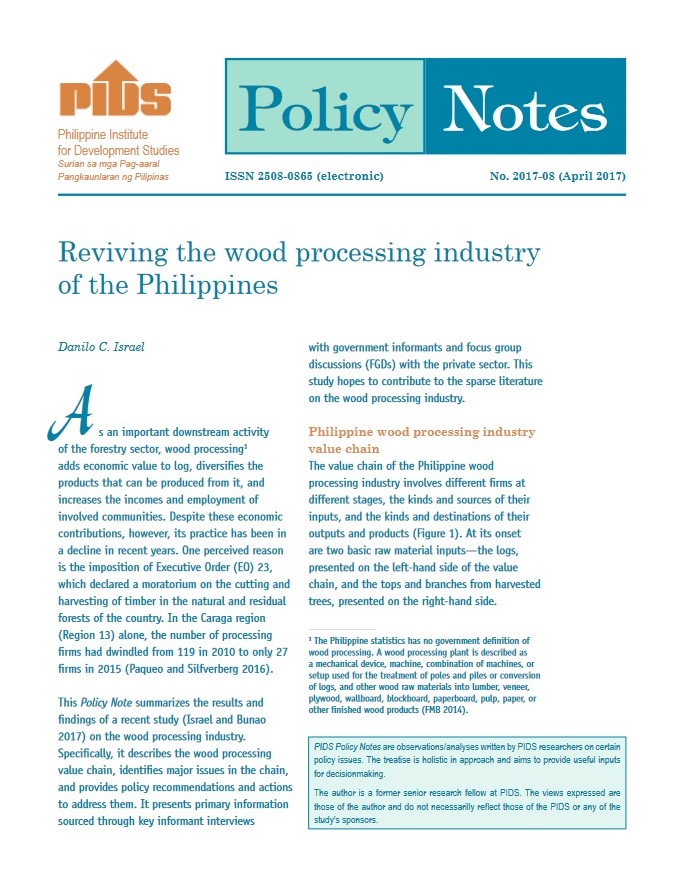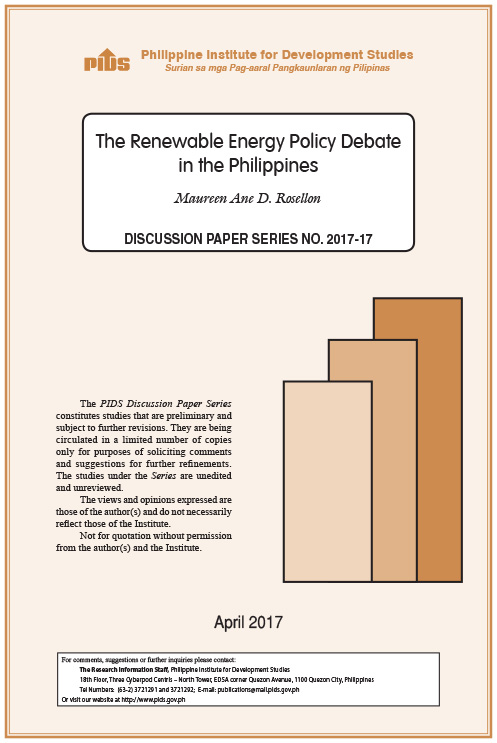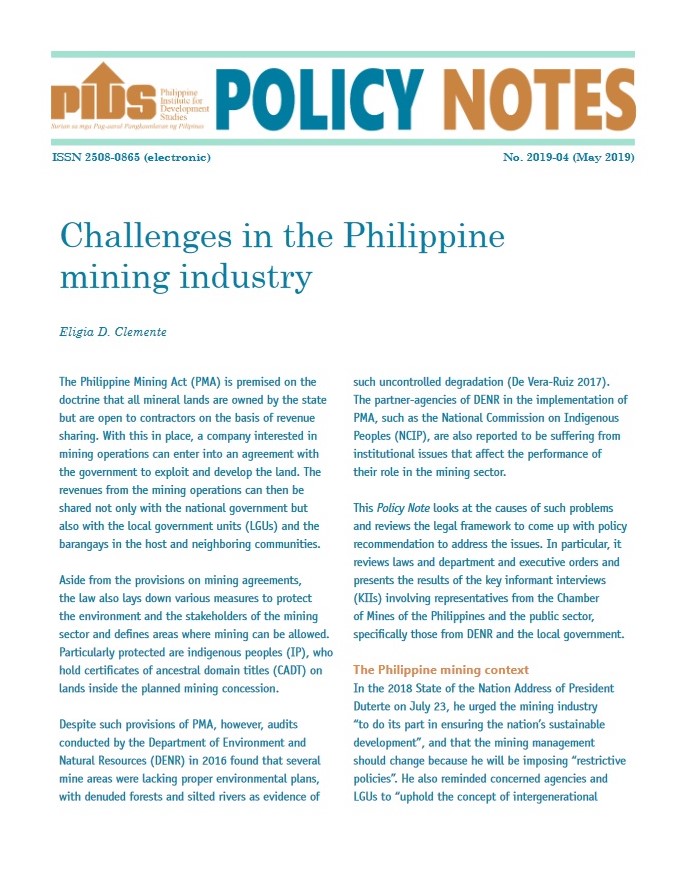The government is being urged to review Executive Order (EO) No. 23, which places an indefinite log ban in the Philippines, as the order is seen as a major factor for the stagnation of the wood processing industry, according to a newly released study.
As an important downstream activity of the forestry sector, wood processing adds economic value to log, diversifies the products that can be produced from it, and increases the incomes and employment of involved communities,” said the report “Reviving the Wood Processing Industry of the Philippines.”
Despite these economic contributions, however, its practice has been in a decline in recent years,” added the report published by the Philippine Institute for Developmental Studies (PIDS).
In the Caraga region alone, the number of processing firms had dwindled from 119 in 2010 to only 27 firms in 2015, said study author Danilo Israel.
One reason perceived is EO No. 23, which declares a moratorium on the cutting and harvesting of timber in the natural and residual forests of the country.
The implementation of EO 23 affected not only the supply of wood products to the wood processing industry but also increased unemployment in the rural areas. It also encourages the practice of illegal logging,” the paper noted.
In addition, “the unstable and inconsistent policies related to the wood processing industry have worsened the situation.” For instance, said the report, frequent policy changes related to the harvesting of logs have discouraged investments in wood processing.
The Philippine government has neglected the industry partly because of the strengthened environmental lobby favoring the log ban. Yet, at no other time in its existence [than now is the industry] in dire need of attention and assistance.”
The PIDS policy note said because of neglect, “the country’s wood processing industry value chain is saddled with numerous issues constraining its development.”
Among these is outdated production equipment and technology leading to inefficiencies and low recovery rates that generate a large volume of wastes.
Wood processing firms should be encouraged to retool, said the document. Micro, small, and medium-sized enterprises (MSMEs) can tap the Department of Science and Technology-Small Enterprise Technology Upgrading Program for their technological improvement.
More importantly, “the industry needs a skills and technology road map, which can establish collaborative arrangements between industry members to develop new technologies and promote highly skilled human resource,” the report added.
Lack of collateral and the tedious loan application process is another hindrance, according to PIDS.
MSMEs can open up to foreign investors and explore various government incentive programs to modernize. Meanwhile, financial institutions should streamline and simplify loan application processes,” the report suggested.
In addition, the inconsistent and inadequate supply of logs, both local and imported, prevents some firms from operating at full capacity, increases average costs, and hinders processing firms from benefiting from economies of scale.
Moreover, some firms have reduced or stopped exporting due to their failure to compete with the lower-priced products of other Southeast Asian countries.
MSMEs also lack the capability to develop new markets due to limited market intelligence.
The country’s importation of cheaper yet substandard products, particularly plywood, from China creates an unfair competition for local manufacturers as well.
To overcome all of these issues, the policy document recommends that firms promote product quality and work for certification, such as the Forest Stewardship Council-Chain of Custody certification that labels products as supportive of responsible forest management.
It also calls on the government and trade associations to aggressively assist firms in marketing. The government can help MSME representatives attend relevant fora and symposiums through financial sponsorship and other means.
The customs administration should strictly implement Philippine standards on imported wood products to prevent the entry of substandard wood into the country.
Besides this, the government should actively support nongovernment and private reforestation efforts and consider the wide use of contract farming of trees.
Under contract farming, firms can help farmers secure pasture leases for vacant government lands they can convert into tree plantations,” said the paper.
An aggressive research and development (R&D) program for non-wood raw material inputs like rattan, bamboo, and nipa should be conducted. However, the development of these materials should consider their potential effects on the natural environment.
Firms must also develop innovative means to reduce gasoline consumption and make their operations more energy efficient. Labor power should likewise be encouraged.
Finally, the government should strictly monitor the industry’s waste management processes. As part of R&D efforts, the utilization of waste as an input in the production of new products should be studied, said the research paper.. (Philexport News & Features)
As an important downstream activity of the forestry sector, wood processing adds economic value to log, diversifies the products that can be produced from it, and increases the incomes and employment of involved communities,” said the report “Reviving the Wood Processing Industry of the Philippines.”
Despite these economic contributions, however, its practice has been in a decline in recent years,” added the report published by the Philippine Institute for Developmental Studies (PIDS).
In the Caraga region alone, the number of processing firms had dwindled from 119 in 2010 to only 27 firms in 2015, said study author Danilo Israel.
One reason perceived is EO No. 23, which declares a moratorium on the cutting and harvesting of timber in the natural and residual forests of the country.
The implementation of EO 23 affected not only the supply of wood products to the wood processing industry but also increased unemployment in the rural areas. It also encourages the practice of illegal logging,” the paper noted.
In addition, “the unstable and inconsistent policies related to the wood processing industry have worsened the situation.” For instance, said the report, frequent policy changes related to the harvesting of logs have discouraged investments in wood processing.
The Philippine government has neglected the industry partly because of the strengthened environmental lobby favoring the log ban. Yet, at no other time in its existence [than now is the industry] in dire need of attention and assistance.”
The PIDS policy note said because of neglect, “the country’s wood processing industry value chain is saddled with numerous issues constraining its development.”
Among these is outdated production equipment and technology leading to inefficiencies and low recovery rates that generate a large volume of wastes.
Wood processing firms should be encouraged to retool, said the document. Micro, small, and medium-sized enterprises (MSMEs) can tap the Department of Science and Technology-Small Enterprise Technology Upgrading Program for their technological improvement.
More importantly, “the industry needs a skills and technology road map, which can establish collaborative arrangements between industry members to develop new technologies and promote highly skilled human resource,” the report added.
Lack of collateral and the tedious loan application process is another hindrance, according to PIDS.
MSMEs can open up to foreign investors and explore various government incentive programs to modernize. Meanwhile, financial institutions should streamline and simplify loan application processes,” the report suggested.
In addition, the inconsistent and inadequate supply of logs, both local and imported, prevents some firms from operating at full capacity, increases average costs, and hinders processing firms from benefiting from economies of scale.
Moreover, some firms have reduced or stopped exporting due to their failure to compete with the lower-priced products of other Southeast Asian countries.
MSMEs also lack the capability to develop new markets due to limited market intelligence.
The country’s importation of cheaper yet substandard products, particularly plywood, from China creates an unfair competition for local manufacturers as well.
To overcome all of these issues, the policy document recommends that firms promote product quality and work for certification, such as the Forest Stewardship Council-Chain of Custody certification that labels products as supportive of responsible forest management.
It also calls on the government and trade associations to aggressively assist firms in marketing. The government can help MSME representatives attend relevant fora and symposiums through financial sponsorship and other means.
The customs administration should strictly implement Philippine standards on imported wood products to prevent the entry of substandard wood into the country.
Besides this, the government should actively support nongovernment and private reforestation efforts and consider the wide use of contract farming of trees.
Under contract farming, firms can help farmers secure pasture leases for vacant government lands they can convert into tree plantations,” said the paper.
An aggressive research and development (R&D) program for non-wood raw material inputs like rattan, bamboo, and nipa should be conducted. However, the development of these materials should consider their potential effects on the natural environment.
Firms must also develop innovative means to reduce gasoline consumption and make their operations more energy efficient. Labor power should likewise be encouraged.
Finally, the government should strictly monitor the industry’s waste management processes. As part of R&D efforts, the utilization of waste as an input in the production of new products should be studied, said the research paper.. (Philexport News & Features)











